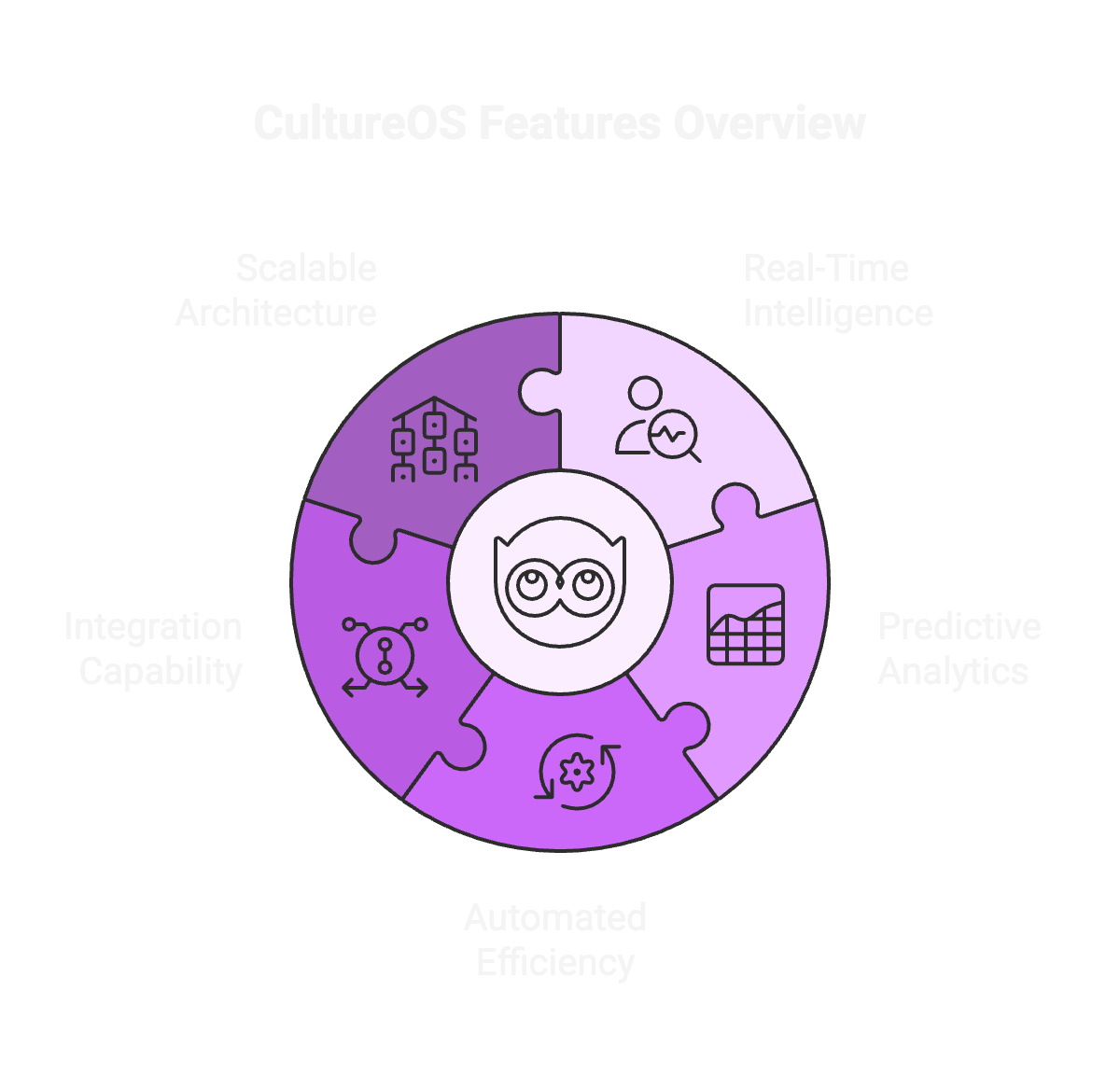Business leaders today face a critical challenge: while organizational culture directly impacts performance, traditional management approaches consistently underdeliver. A recent comprehensive study of 5,655 employees reveals a striking leadership blind spot: 79% of senior executives report minimal exposure to toxic workplace behaviors, while 49% of frontline employees experience regular workplace hostility.
This disconnect carries significant financial implications. Research indicates that 70% of culture transformation initiatives fail to achieve their business objectives, contributing to approximately $223 billion in annual losses from dysfunctional workplace dynamics. For individual organizations, this translates to roughly $15,000 per employee annually in lost productivity.
Current culture management approaches rely primarily on annual engagement surveys and reactive interventions. While these methods provide baseline data, they suffer from critical limitations: delayed insights that arrive months after problems emerge, insufficient detail for targeted action, and fragmented systems that prevent holistic understanding of organizational dynamics.
What is CultureOS?
A Strategic Management Framework
CultureOS represents a fundamental shift in how organizations approach culture management—from periodic measurement to continuous operational oversight. Just as financial operating systems provide real-time visibility into revenue, costs, and profitability, CultureOS delivers ongoing insights into cultural health, engagement drivers, and performance predictors.
This approach treats organizational culture as a critical business system requiring the same level of sophistication and attention as financial management, operations, or technology infrastructure. Rather than viewing culture as an abstract concept measured annually, CultureOS positions it as a strategic asset that demands continuous monitoring and optimization.
Core Business Principles
Real-Time Intelligence: Continuous monitoring of cultural indicators enables leaders to identify and address issues before they impact business performance or employee retention.
Predictive Analytics: Advanced algorithms analyze behavioral patterns to forecast potential problems, allowing proactive intervention rather than reactive damage control.
Automated Efficiency: Intelligent systems reduce the administrative burden on HR teams while ensuring consistent culture management across all organizational levels.
Integration Capability: Seamless connection with existing business systems ensures culture data informs broader strategic decisions and operational planning.
Scalable Architecture: Platform capabilities expand with organizational growth, maintaining culture consistency from startup to enterprise scale.

Strategic Advantages Over Traditional Approaches
Traditional culture management typically involves:
- Annual or quarterly employee surveys
- Delayed analysis and reporting cycles
- Generic improvement programs
- Manual data interpretation
- Reactive problem-solving
CultureOS methodology delivers:
- Continuous real-time feedback collection
- Immediate insight generation and alerts
- Personalized intervention recommendations
- Automated data processing and pattern recognition
- Proactive risk identification and prevention
The Evolution of Culture Management in Business
From Industrial to Information Age
Culture management practices evolved from industrial psychology research, progressing through job satisfaction studies, climate assessments, and digital survey platforms. However, fundamental limitations have persisted throughout this evolution.
Contemporary business environments require culture management systems that match the pace and complexity of modern organizations. Remote work, rapid scaling, generational workforce changes, and competitive talent markets demand more sophisticated approaches than traditional methods can provide.
Business Drivers for Advanced Culture Management
Several factors make sophisticated culture management a business imperative:
Talent Competition: Organizations with superior cultures attract and retain top performers in competitive markets.
Operational Efficiency: Strong cultures reduce management overhead, accelerate decision-making, and improve cross-functional collaboration.
Risk Management: Proactive culture monitoring prevents issues that could escalate into legal, compliance, or reputational problems.
Change Agility: Organizations with healthy cultures adapt more successfully to market changes, restructuring, and strategic pivots.
Customer Impact: Employee experience directly correlates with customer satisfaction and business results.
Happily.ai: An Enterprise CultureOS Solution
Technology Foundation
Happily.ai was developed through research at MIT, combining organizational psychology insights with advanced data analytics. The platform addresses the operational challenges executives face in scaling culture across distributed teams and rapid growth scenarios.
The technology stack leverages advanced AI models, including proprietary machine learning algorithms trained specifically for organizational behavior analysis. This custom AI approach processes workplace communications for sentiment, engagement indicators, and cultural alignment signals, delivering insights tailored to workplace dynamics rather than generic text analysis.
Business-Focused Methodology
Rather than relying on lengthy quarterly surveys that disrupt productivity, Happily.ai employs brief daily interactions that integrate naturally into workflow. This approach addresses several executive concerns:
Productivity Impact: 1-3 minute daily touchpoints minimize disruption while maximizing data quality Employee Experience: Engaging, meaningful realationship-building interactions reduce survey fatigue Data Currency: Daily collection provides actionable insights rather than historical reports Adoption Success: Gamified elements and social features drive consistent participation
Operational Integration
The platform connects with existing business systems to provide culture data alongside operational metrics. Leaders can correlate cultural indicators with business performance, enabling data-driven decisions about organizational development investments and strategic culture initiatives.
CultureOS Business Applications and ROI
Executive Dashboard and Analytics
The platform provides leadership teams with comprehensive visibility into organizational culture through:
Real-Time Monitoring: Live tracking of team sentiment, engagement levels, and cultural alignment across departments and locations.
Predictive Intelligence: Early warning systems for potential turnover, team conflicts, and culture risks that could impact business performance.
Manager Effectiveness: Measurement and improvement of leadership capabilities through AI-powered coaching recommendations and performance tracking.
Values Integration: Assessment of how effectively organizational values are being demonstrated in daily behaviors and decision-making.
Operational Efficiency Improvements
Reduced Management Overhead: Automated systems handle routine culture management tasks, freeing managers to focus on strategic leadership activities.
Faster Problem Resolution: Issues are identified and addressed within days rather than months, preventing escalation and reducing costly interventions.
Improved Manager Performance: Leaders receive specific guidance on team interactions, recognition timing, and conflict resolution strategies.
Enhanced Communication: AI analysis identifies communication gaps and provides recommendations for improving team collaboration and information flow.
Financial Impact and Business Results
Organizations implementing CultureOS solutions typically observe:
Retention Improvements: 25-40% reduction in voluntary turnover, saving significant recruitment and training costs.
Engagement Gains: Average 60-point improvement in Employee Net Promoter Scores within 90 days of implementation.
Productivity Increases: Enhanced team collaboration and reduced conflict result in measurable productivity improvements.
Adoption Success: Consistent 97%+ employee participation rates, ensuring comprehensive organizational coverage.
Proven Business Results and Case Studies
Quantitative Performance Improvements
Multiple organizations have documented significant improvements following CultureOS implementation:
Financial Performance: Companies report measurable ROI within 3-6 months through reduced turnover costs, improved productivity, and enhanced customer satisfaction scores.
Operational Metrics: Organizations achieve 97%+ employee participation rates, compared to 40-60% typical of traditional survey programs.
Cultural Indicators: Employee Net Promoter Scores improve by an average of 60 points within the first 90 days, indicating substantial engagement improvements.
Management Effectiveness: Leaders demonstrate measurable improvements in team satisfaction ratings and leadership assessment scores.
Organizational Case Examples
Manufacturing Operations: A 300-employee manufacturing company successfully maintained cultural cohesion during rapid expansion, achieving retention rates 40% higher than industry averages while scaling operations.
Technology Teams: Distributed software development teams identified and resolved workflow inefficiencies through daily cultural insights, resulting in 35% improvement in project delivery metrics.
Management Development: Across multiple client organizations, managers utilizing AI-powered coaching systems showed significant improvements in team leadership effectiveness and employee satisfaction scores.
Comparative Analysis
Studies comparing CultureOS implementations with traditional culture management approaches demonstrate:
Response Time: Problems are identified and addressed within days rather than the months required by traditional survey-based systems.
Accuracy: Real-time data collection provides more precise cultural assessment than retrospective annual surveys.
Cost Efficiency: Platform investment typically pays for itself within the first year through reduced turnover and improved productivity.
Scalability: Digital architecture enables consistent culture management across diverse organizational sizes and geographic locations.
Strategic Implications for Business Leadership
Competitive Advantage Through Culture Management
Organizations implementing CultureOS gain several strategic advantages:
Talent Acquisition: Companies with measurably strong cultures attract higher-quality candidates and reduce recruiting costs.
Change Management: Real-time cultural monitoring enables more successful organizational transitions, mergers, and strategic pivots.
Risk Mitigation: Early identification of cultural issues prevents problems that could escalate into legal, compliance, or reputational crises.
Innovation Capacity: Psychologically safe environments measured and maintained through CultureOS foster increased creativity and strategic thinking.
Operational Excellence Applications
Distributed Teams: Remote and hybrid work environments require sophisticated culture management tools to maintain cohesion and performance.
Rapid Growth: Scaling organizations need systematic approaches to preserve culture while expanding operations and adding personnel.
Performance Management: Integration of cultural data with business metrics enables more effective leadership decisions and resource allocation.
Succession Planning: Understanding team dynamics and leadership capabilities supports more effective talent development and promotion decisions.
Future Business Considerations
Forward-thinking organizations are already recognizing culture as a critical business asset requiring systematic management. Key trends include:
Data-Driven HR: Integration of cultural analytics with broader business intelligence systems for comprehensive organizational insights.
Predictive Management: Shift from reactive problem-solving to proactive opportunity identification and risk prevention.
Personalized Leadership: AI-enabled coaching systems that help managers develop more effective leadership capabilities.
Cultural Intelligence: Using cultural data to inform strategic decisions about organizational structure, policies, and business strategy.
Implementation Strategy and Business Planning
Executive Planning Framework
Successful CultureOS implementation requires strategic planning and executive commitment:
Phase 1: Assessment and Planning (30 days): Baseline measurement of current culture state, identification of key business objectives, and establishment of success metrics.
Phase 2: System Deployment (30 days): Technical implementation, employee onboarding, and initial data collection to establish behavioral baselines.
Phase 3: Active Management (30 days): Full activation of coaching, recognition, and intervention systems with continuous monitoring of business impact.
Phase 4: Optimization (Ongoing): Refinement of systems and processes based on business outcomes and organizational feedback.

Expected Business Outcomes
Based on implementation data across multiple organizations, executives should anticipate:
Immediate Results (0-30 days): High employee adoption rates, establishment of daily feedback rhythms, and initial cultural pattern identification.
Short-term Impact (30-90 days): Measurable improvements in engagement scores, manager effectiveness, and team communication quality.
Medium-term Results (90-365 days): Significant improvements in retention rates, productivity metrics, and organizational culture indicators.
Long-term Value (12+ months): Sustained cultural transformation, improved business performance, and enhanced organizational resilience.
Investment Considerations
Organizations considering CultureOS implementation should evaluate:
Total Cost of Ownership: Platform costs, implementation support, and ongoing management requirements compared to current culture management expenses.
ROI Timeline: Most organizations achieve positive return on investment within 3-6 months through reduced turnover and improved productivity.
Resource Requirements: Minimal ongoing administrative burden due to automated systems and high employee adoption rates.
Integration Complexity: Seamless connection with existing HR and business systems to maximize data value and minimize operational disruption.
Conclusion
CultureOS represents a significant advancement in organizational culture management, providing business leaders with the tools and insights necessary to treat culture as a strategic asset rather than an operational afterthought. The evidence demonstrates substantial improvements in both cultural indicators and business outcomes through real-time measurement, predictive intelligence, and automated management systems.
For executives and HR leaders, the strategic question is not whether to adopt more sophisticated culture management approaches, but how quickly to implement systems that provide competitive advantage through superior employee experience and organizational performance.
The demonstrated effectiveness of CultureOS methodology, exemplified through platforms like Happily.ai, offers a data-driven approach to culture management that aligns with contemporary business requirements for agility, efficiency, and measurable results. Organizations that implement these systems today position themselves for sustainable competitive advantage in increasingly talent-competitive markets.
The business case for CultureOS is clear: improved retention, enhanced productivity, better leadership effectiveness, and stronger organizational resilience. The implementation pathway is proven, and the technology is mature. The primary consideration for business leaders is execution speed and organizational commitment to culture as a strategic priority.









